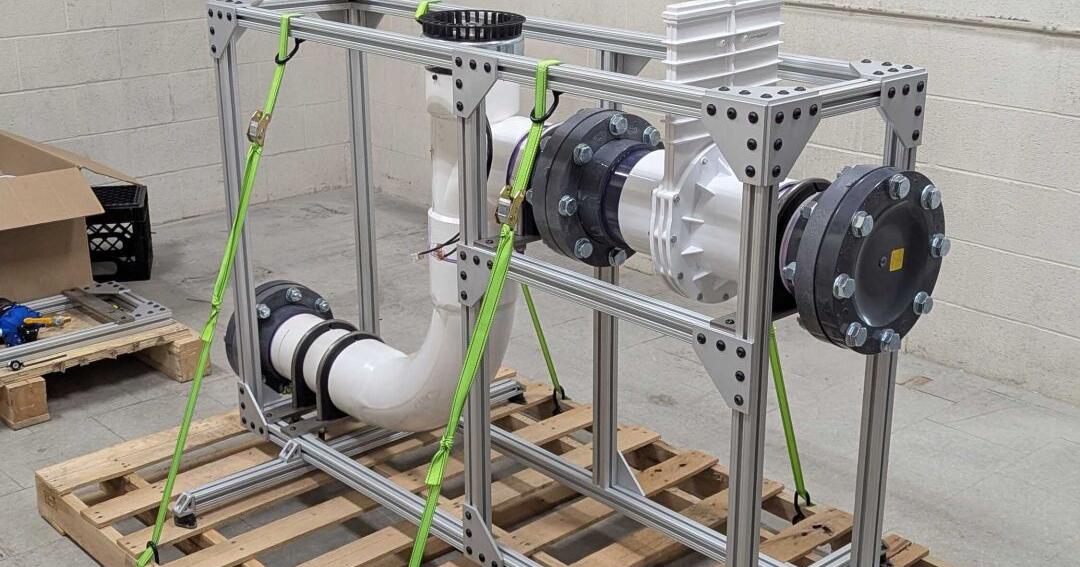Hydroelectric power accounts for more than 60 per cent of Canada’s energy. While enormous projects in B.C., Manitoba, Ontario, Quebec and Newfoundland and Labrador generate electricity that is considered “green,” they’ve also generated controversy related to their environmental impact, cost overruns and fraught relations with local and Indigenous communities. These issues point to why experts have suggested we’re approaching the end of the era of big dams.
The good news: a new wave of more sustainable small-scale, AI-enabled hydroelectric solutions is cresting the horizon. Earlier this month, P.E.I.-based startup Aslan Renewables closed a $1.25-million pre-seed round, led by Singapore-based Antares Ventures, to scale its modular turbine technology. These mini turbines are designed to be installed in rivers near decommissioned dams.
“Let’s put these things in the water and show Canadians what the future of hydro looks like,” says founder and CEO Andrew Murray, who anticipates that Aslan will install its turbines in P.E.I. and Ontario by mid-December — with plans to have 100 in place across the country by the end of 2026. The company, which launched in 2020, has identified 60,000 locations throughout Canada that could be served by its scalable, modular turbines.
According to Murray, small-scale hydro projects haven’t previously been viable due to the cost of managing and monitoring every site. But AI has unlocked big potential in mini assets. Aslan’s systems, he says, are fully autonomous, which helps mitigate their impact on the environment. “They can detect fish migration and shut themselves down. They can adapt to river pH and dissolve oxygen. They can measure their own efficiency and report back.”
And after an unexpected adversary compromised the success of early pilot efforts, Aslan adapted its technology to solve the problem. “Beavers were chewing up the wires and blocking our inlets,” says Murray. “Now, we can detect a beaver’s presence and send out a pulse underwater to ask it to choose a different location.”
Touted as an Ikea version of a hydro dam, the potential of Aslan’s tech is already being recognized for much broader application. In October, the company won a top prize at the Climate Impact Innovations Challenge in Indonesia. The award includes $600,000 (U.S.) in funding that will be distributed among Aslan and two other winners to build local projects. As Antares managing partner Michael Gryseels noted in a release, “hydropower remains one of the most overlooked yet proven renewable sources across Asia, particularly in rural regions,” where the firm sees great potential to deploy Aslan’s model.
“We’re seeing our opportunities in that part of the world explode,” says Murray.
Manzil’s halal trading option hits Nasdaq
Toronto-based Manzil, which launched in 2020 with the goal of becoming “the Halal version of Wealthsimple,” rolled out its inaugural halal exchange-trading fund (ETF) on the Nasdaq last week. The company provides Muslim customers with banking options that align with Sharia principles (charging and profiting from interest, for instance, is prohibited by Islamic law); to that end, the companies represented in its ETF have been thoroughly vetted to ensure their practices fit the bill.
Quilt unfurls across Canada
Co-founded in 2022 by Paul Lambert, a Canadian whose resumé includes working in sustainability at Google’s Area 120 incubator, California startup Quilt rolled out its ductless heat pumps in San Francisco in 2024 and expanded to other states across the U.S. shortly after. The company has now launched its smart temperature-regulating home tech in key Canadian markets: Ontario, Manitoba, British Columbia and Nova Scotia.
Microsoft partners with B.C. startup for solar projects
Vancouver-based PowerTrust, which has developed a platform that connects corporate funders with renewable energy initiatives in key local markets, has struck a deal with Microsoft that will help catalyze distributed solar projects in Latin America. The collaborative arrangement aims to bring 270 megawatts of solar power to underserved communities in Mexico and Brazil by 2030.
By the numbers
$2 million: Amount raised by MedReddie in its recent round of funding. The medtech startup, which is based in Saint John, N.B., and Waterloo, Ont., has developed a platform to help hospitals and health-care organizations make decisions about procurement by synthesizing data and regulatory information.
$55 billion: Canada’s gross domestic expenditures on R&D in 2024, according to a new report on the state of the country’s science, technology and innovation from the Council of Canadian Academies; the authors note that this leaves us lagging behind peer nations in this area.
45 per cent: Proportion of Canadian venture capital firms where women occupied at least half the spots on senior investment teams in 2024, per a recent analysis by BDC Capital. That figure is a notable improvement from 2023, when only 38 per cent of firms reported gender parity among their top ranks.
Dominique Ritter writes about technology for MaRS. Torstar, the parent company of the Toronto Star, has partnered with MaRS to highlight innovation in Canadian companies.



